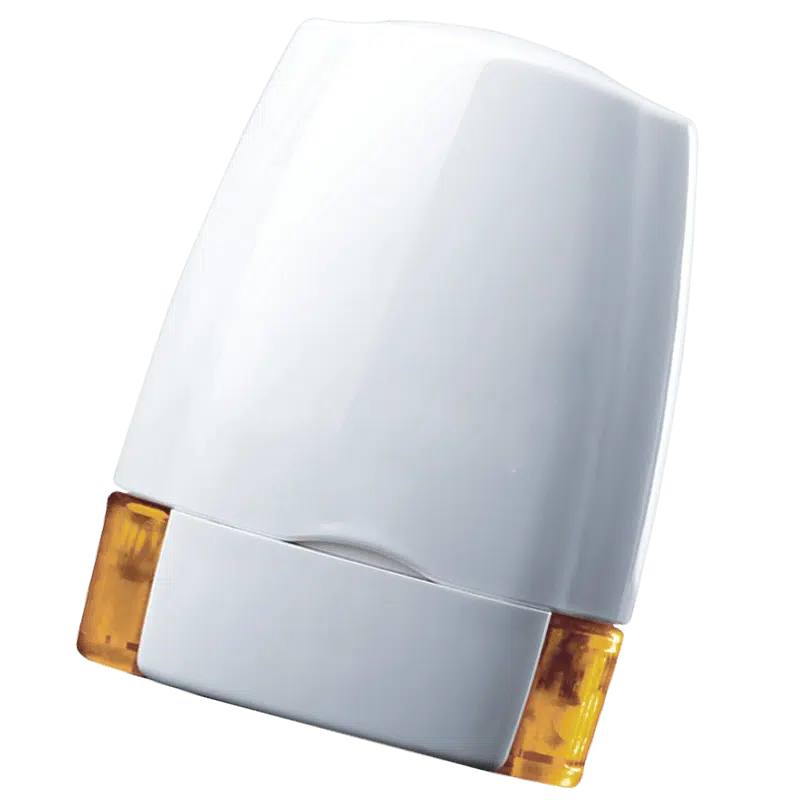Improves lung function and reduces COPD symptoms.


Seebri Breezhaler is a treatment for the symptoms of Chronic Obstructive Pulmonary Disease (COPD).
Talk to us about your health and we’ll recommend the best treatment for you. Order Seebri Breezhaler online on a subscription that you can cancel whenever you like.
The Seebri Breezhaler is what is known as a ‘LAMA’, which stands for long acting muscarinic antagonist. It’s an inhaler that comes with inhalable capsules, which are used to treat and ease the symptoms of COPD by relaxing the muscle walls around the airways.
COPD isn’t a specific condition, but rather a blanket term that’s used to describe several different chronic conditions which affect the lungs and the airways - which inhibit breathing as a result. Among these conditions includes the likes of bronchitis, emphysema and chronic obstructive airways disease.
The Seebri Breezhaler uses a drug called glycopyrronium bromide - an antimuscarinic agent which is effective at opening up your airways. It’s done by blocking the receptors of the cells that are responsible for controlling the contraction of the lungs. As a result, the respiratory system is relaxed and allows for easier breathing. This effect is achieved because when people are suffering with COPD, their symptoms tend to manifest themselves as a phlegmy cough, increased susceptibility to chest infections, wheezing and a shortness of breath. This is because COPD results in an inflammation in the lining of the airways, which causes lasting damage and the development of the above symptoms.
Often these conditions are caused by external factors like smoking. A clinician will recommend that you stop smoking straight away if you develop COPD. This won’t always put an end to the problem, though, because the damage could have already been done - but it will reduce the risk of further infections and other inflammatory, chronic conditions from happening. This is when treatments such as Seebri Breezhaler will be recommended as, if taken every day, they can help you to manage the symptoms of COPD.
Seebri Breezhaler is a capsule, which is delivered through an inhaler device. These capsules come in 44 microgram doses. Usually you’ll be prescribed a dosage of one capsule a day, but this can change depending on what your clinician thinks is needed.

How we source info.
When we present you with stats, data, opinion or a consensus, we’ll tell you where this came from. And we’ll only present data as clinically reliable if it’s come from a reputable source, such as a state or government-funded health body, a peer-reviewed medical journal, or a recognised analytics or data body. Read more in our editorial policy.
It’s important that you always use the Seebri Breezhaler as you’ve been told to by our clinician. Always double check if you’re not sure of the correct dosage. Usually you’ll need to inhale one capsule a day but, regardless of the amount, taking Seebri Breezhaler is reasonably straightforward:
Using the inhaler is also straightforward:
Studies have shown that glycopyrronium (the active ingredient in the Seebri Breezhaler) has a faster onset of action than tiotropium and aclidinium (two other commonly used treatments for COPD) . As a result, it usually works quickly to help you to breathe more freely, and provides long-acting relief.
If you’re having trouble using your inhaler then you should contact your clinician for help.
If you accidentally take too much, you should seek medical help straight away.
And if you forget a dose then you can take it as soon as you remember. That is unless it’s close to your next dose, in which case just leave the forgotten one. It is important that you do not double up on a dosage to make up for a missed one.

How we source info.
When we present you with stats, data, opinion or a consensus, we’ll tell you where this came from. And we’ll only present data as clinically reliable if it’s come from a reputable source, such as a state or government-funded health body, a peer-reviewed medical journal, or a recognised analytics or data body. Read more in our editorial policy.
Have something specific you want to know? Search our info below, or ask our experts a question if you can’t find what you’re looking for.
Once-daily glycopyrronium bromide (Seebri Breezhaler®) for the treatment of chronic obstructive pulmonary disease (COPD). Expert Opinion on Pharmacotherapy, 16(17), pp.2653–2659.
Efficacy and safety of twice-daily glycopyrrolate in patients with stable, symptomatic COPD with moderate-to-severe airflow limitation: the GEM1 study. International Journal of Chronic Obstructive Pulmonary Disease, p.1233.
Treatment
Great fast delivery
Great service
Great service

Registered with GMC (No. 4624794)
Meet Daniel
Registered with GPhC (No. 2202465)
Meet Sanjeda
Registered with GPhC (No. 2070724)
Meet CraigDelivery, consultation, treatment. It’s all included in the price.
| Quantity | Starting from |
|---|---|
| 30 Capsule | £73.95 |
| 60 Capsule | £130.95 Save £16.95 |
| 90 Capsule | £193.95 Save £27.90 |
| Quantity | Starting from |
|---|---|
| 1 Pack | £83.95 |
| 2 Pack | £152.95 Save £14.95 |
| 3 Pack | £217.95 Save £33.90 |
| Quantity | Starting from |
|---|---|
| 1 Dose | £33.95 |
| 2 Dose | £53.95 Save £13.95 |
| 3 Dose | £72.95 Save £28.90 |
| Quantity | Starting from |
|---|---|
| 120 Capsules | £28.95 |
| 240 Capsules | £44.95 Save £12.95 |
| 360 Capsules | £56.95 Save £29.90 |
| Quantity | Starting from |
|---|---|
| 60 dose(s) | £66.95 |
| 120 dose(s) | £112.95 Save £20.95 |
| Quantity | Starting from |
|---|---|
| 30 Dual Doses | £83.95 |
| 120 Dual Doses | £152.95 Save £182.85 |
| 180 Dual Doses | £221.95 Save £281.75 |
| Quantity | Starting from |
|---|---|
| 30 Capsule | £88.95 |
| 60 Capsule | £162.95 Save £14.95 |
| 90 Capsule | £233.95 Save £32.90 |
| Quantity | Starting from |
|---|---|
| 30 Pack | £106.95 |
| 60 Pack | £198.95 Save £14.95 |
| 90 Pack | £279.95 Save £40.90 |
| Quantity | Starting from |
|---|---|
| 120 Pack | £116.95 |
| 240 Pack | £208.95 Save £24.95 |
| 360 Pack | £289.95 Save £60.90 |
We know health, but you know you.
Our experts tell you what’s safe, but you decide what’s best.
Answer a few questions and tell us about yourself. Get tailored advice from our clinicians so you can choose better.

Choose your treatment and how often you have it delivered.

We know things change. It’s the nature of life. We’ll check in regularly to make sure your treatment is still right for you.
Pause. Change. Skip. Start again. Any time you like.
Always arrives on time and I’m kept informed of progress.
I have had it previously from my G.P so It worked as expected, extremely well. My problem is an accessing my G.P practice, they put ED well down their list of priorities. I found your service excellent, quick and efficient. I fully intend to continue using it
Shipping is speedy and the product is amazing.
Fast, slick service. Very easy to amend subscription when required.
All good.
Great service
Really helped me
Trusted service and great service - next day delivery and I can rely on them to send regularly.
Ordering was straight forward, tablets delivered promptly and well packaged, and instructions were clear, thanks.
100% recomended.Great service
Excellent service
Excellent delivery. Can’t fault.
Quick and efficient service, delivered discreetly the next day. Thank you.
Effective
Great service, no wait time
Great
Quick assessing for medicine suitability. Quick delivery and good communication throughout.
Straightforward and quick service!
Good however communication could sometimes be better
Easy and good procedure to get treatment
Excellent product
Excellent service!!! Ordered what I needed sent a picture of my prescription and the parcel arrived the next day!!! Will definitely order again and have recommended to others!!!
Fast shipping
Very quick service all round
So quick and simple. Recommend
Great
Very convenient hassle free service.
Easy to use good communication and fast shipping
Great service
Efficient no issues re delivery
Fabulous service
Brilliant service. Not a bad word to say!
It was fast, professional and it's the right med for what I selected in there.
This review requires content. Oh well..
Great service, quite effortless.
Top notch
Brill service
N/a
Excellent service quick and easy to use
Fast and exact order
Superb service and quick delivery 10/10
Excellent service
Thank you for fast delivery
Shipping is extremely quick and satisfiying
Good stuff
Good service
Great fast delivery
COPD: Here are some other options.
Once-a-day inhaler that relaxes muscles in your lungs, to treat symptoms of COPD.
CFC-free pressurised inhaler. Bronchodilator for use throughout the day.
Breaks down mucus – making it easier to clear when you cough. Two capsules, three times a day.
Nebuliser with two ingredients to help you breathe easier.
Bronchodilator that provides twenty-four-hour COPD relief. Combines an LABA with an anticholinergic.
Eases symptoms and stops COPD getting worse. Powder or capsule options.
Powder inhaler with three active ingredients to improve COPD.
Combination relief and prevention for COPD symptoms, in an MDI or NEXThaler.
We're making healthcare more about you. Sign up to our newsletter for personalised health articles that make a difference.
Disclaimer: The information provided on this page is not a substitute for professional medical advice, diagnosis, or treatment. If you have any questions or concerns about your health, please talk to a doctor.
We couldn't find what you're looking for.
Here's everything we treat. Or, if you're looking for something we don't have yet, you can suggest something.
If there’s a particular treatment or condition you’re looking for, tell us and we’ll look into it for you.
Submit your question here, or tell us if you’ve found an issue on our site.
We’ll get back to you very soon. We aim to respond to all queries in one working day.
You’re signed up to our newsletter. Keep an eye on your inbox for our latest update.
By clicking 'Subscribe now' you're agreeing to our Privacy Policy.
We’ve sent you an email asking you to confirm your email address.